Assignment On Reference list | Sociology
VerifiedAdded on 2022/08/18
|6
|1021
|17
Assignment
AI Summary
Contribute Materials
Your contribution can guide someone’s learning journey. Share your
documents today.
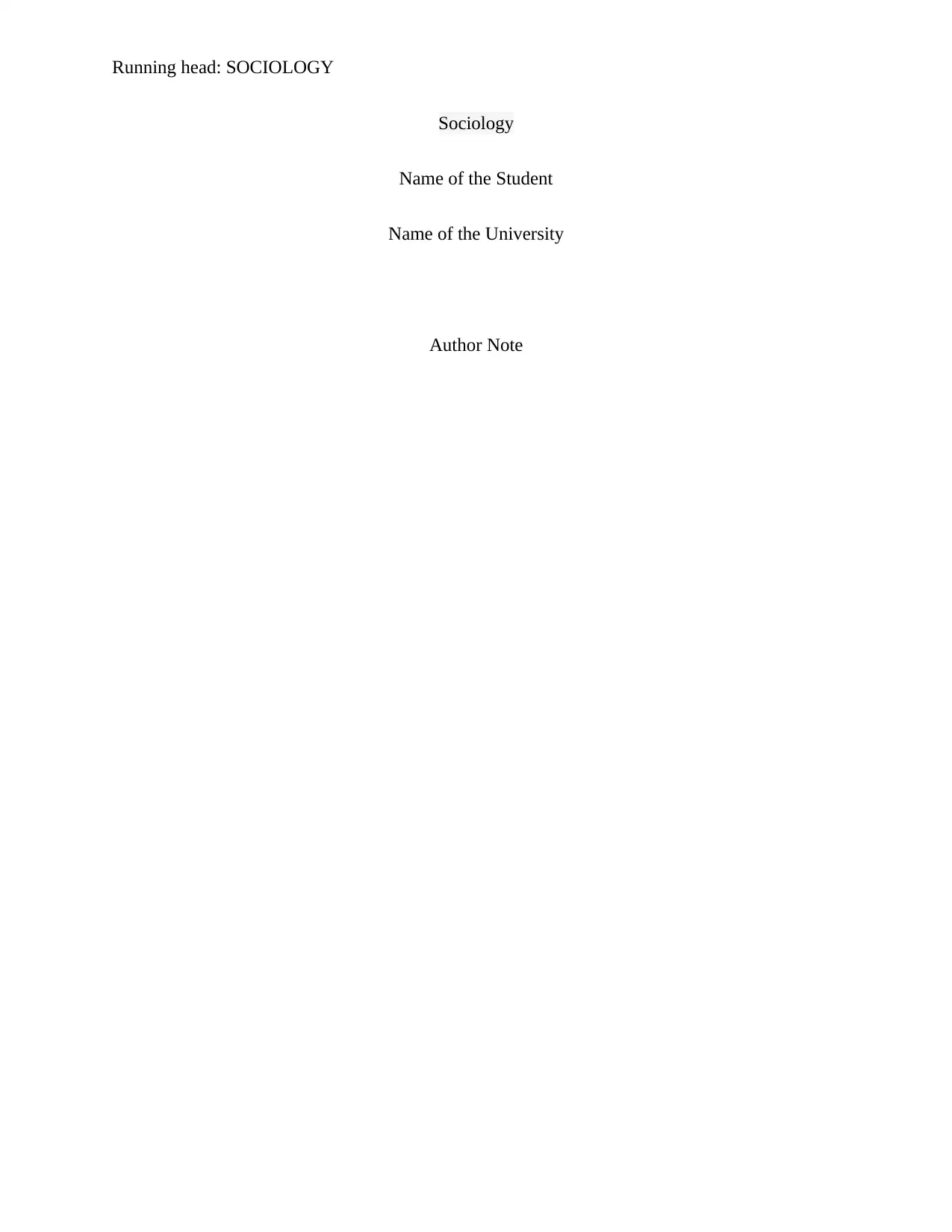
Running head: SOCIOLOGY
Sociology
Name of the Student
Name of the University
Author Note
Sociology
Name of the Student
Name of the University
Author Note
Secure Best Marks with AI Grader
Need help grading? Try our AI Grader for instant feedback on your assignments.
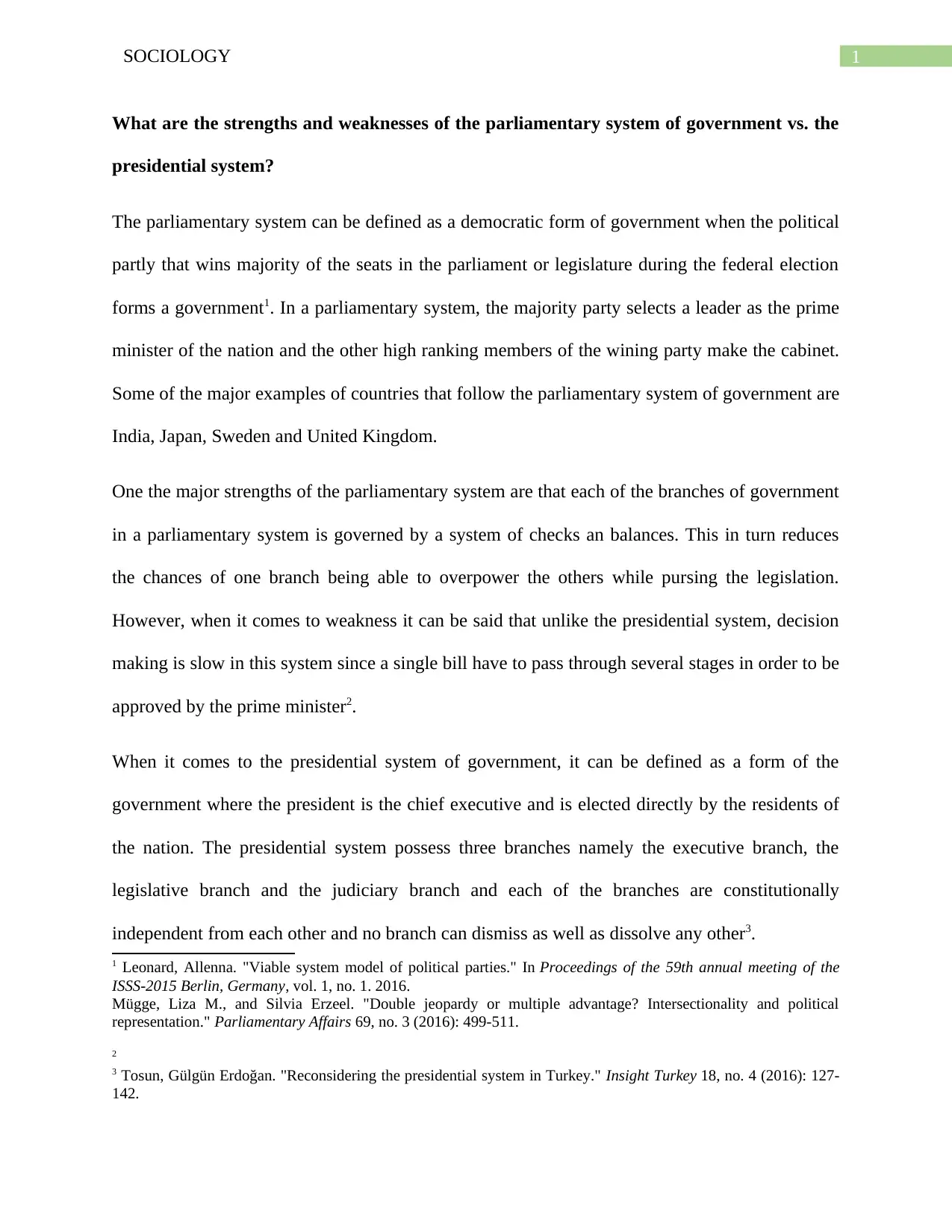
1SOCIOLOGY
What are the strengths and weaknesses of the parliamentary system of government vs. the
presidential system?
The parliamentary system can be defined as a democratic form of government when the political
partly that wins majority of the seats in the parliament or legislature during the federal election
forms a government1. In a parliamentary system, the majority party selects a leader as the prime
minister of the nation and the other high ranking members of the wining party make the cabinet.
Some of the major examples of countries that follow the parliamentary system of government are
India, Japan, Sweden and United Kingdom.
One the major strengths of the parliamentary system are that each of the branches of government
in a parliamentary system is governed by a system of checks an balances. This in turn reduces
the chances of one branch being able to overpower the others while pursing the legislation.
However, when it comes to weakness it can be said that unlike the presidential system, decision
making is slow in this system since a single bill have to pass through several stages in order to be
approved by the prime minister2.
When it comes to the presidential system of government, it can be defined as a form of the
government where the president is the chief executive and is elected directly by the residents of
the nation. The presidential system possess three branches namely the executive branch, the
legislative branch and the judiciary branch and each of the branches are constitutionally
independent from each other and no branch can dismiss as well as dissolve any other3.
1 Leonard, Allenna. "Viable system model of political parties." In Proceedings of the 59th annual meeting of the
ISSS-2015 Berlin, Germany, vol. 1, no. 1. 2016.
Mügge, Liza M., and Silvia Erzeel. "Double jeopardy or multiple advantage? Intersectionality and political
representation." Parliamentary Affairs 69, no. 3 (2016): 499-511.
2
3 Tosun, Gülgün Erdoğan. "Reconsidering the presidential system in Turkey." Insight Turkey 18, no. 4 (2016): 127-
142.
What are the strengths and weaknesses of the parliamentary system of government vs. the
presidential system?
The parliamentary system can be defined as a democratic form of government when the political
partly that wins majority of the seats in the parliament or legislature during the federal election
forms a government1. In a parliamentary system, the majority party selects a leader as the prime
minister of the nation and the other high ranking members of the wining party make the cabinet.
Some of the major examples of countries that follow the parliamentary system of government are
India, Japan, Sweden and United Kingdom.
One the major strengths of the parliamentary system are that each of the branches of government
in a parliamentary system is governed by a system of checks an balances. This in turn reduces
the chances of one branch being able to overpower the others while pursing the legislation.
However, when it comes to weakness it can be said that unlike the presidential system, decision
making is slow in this system since a single bill have to pass through several stages in order to be
approved by the prime minister2.
When it comes to the presidential system of government, it can be defined as a form of the
government where the president is the chief executive and is elected directly by the residents of
the nation. The presidential system possess three branches namely the executive branch, the
legislative branch and the judiciary branch and each of the branches are constitutionally
independent from each other and no branch can dismiss as well as dissolve any other3.
1 Leonard, Allenna. "Viable system model of political parties." In Proceedings of the 59th annual meeting of the
ISSS-2015 Berlin, Germany, vol. 1, no. 1. 2016.
Mügge, Liza M., and Silvia Erzeel. "Double jeopardy or multiple advantage? Intersectionality and political
representation." Parliamentary Affairs 69, no. 3 (2016): 499-511.
2
3 Tosun, Gülgün Erdoğan. "Reconsidering the presidential system in Turkey." Insight Turkey 18, no. 4 (2016): 127-
142.
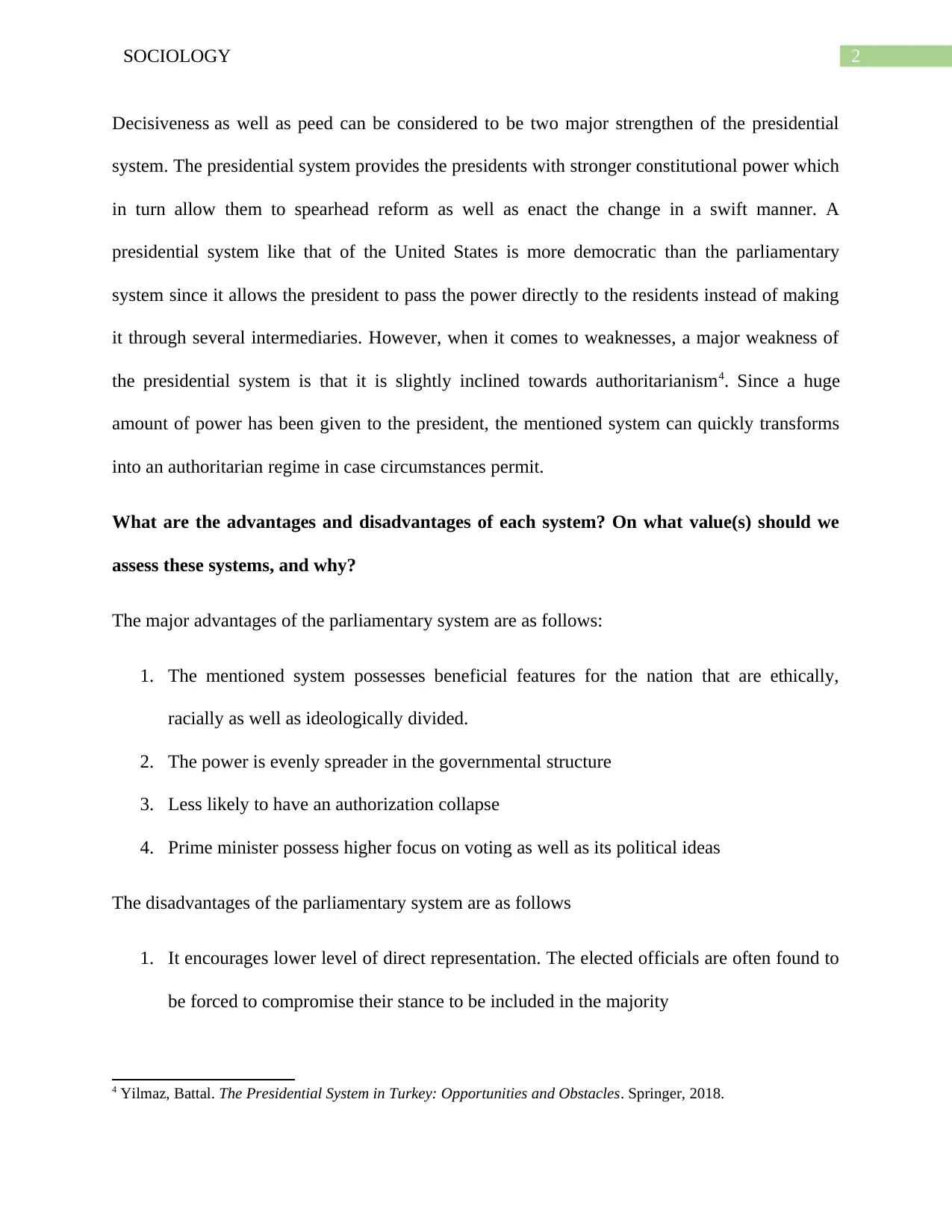
2SOCIOLOGY
Decisiveness as well as peed can be considered to be two major strengthen of the presidential
system. The presidential system provides the presidents with stronger constitutional power which
in turn allow them to spearhead reform as well as enact the change in a swift manner. A
presidential system like that of the United States is more democratic than the parliamentary
system since it allows the president to pass the power directly to the residents instead of making
it through several intermediaries. However, when it comes to weaknesses, a major weakness of
the presidential system is that it is slightly inclined towards authoritarianism4. Since a huge
amount of power has been given to the president, the mentioned system can quickly transforms
into an authoritarian regime in case circumstances permit.
What are the advantages and disadvantages of each system? On what value(s) should we
assess these systems, and why?
The major advantages of the parliamentary system are as follows:
1. The mentioned system possesses beneficial features for the nation that are ethically,
racially as well as ideologically divided.
2. The power is evenly spreader in the governmental structure
3. Less likely to have an authorization collapse
4. Prime minister possess higher focus on voting as well as its political ideas
The disadvantages of the parliamentary system are as follows
1. It encourages lower level of direct representation. The elected officials are often found to
be forced to compromise their stance to be included in the majority
4 Yilmaz, Battal. The Presidential System in Turkey: Opportunities and Obstacles. Springer, 2018.
Decisiveness as well as peed can be considered to be two major strengthen of the presidential
system. The presidential system provides the presidents with stronger constitutional power which
in turn allow them to spearhead reform as well as enact the change in a swift manner. A
presidential system like that of the United States is more democratic than the parliamentary
system since it allows the president to pass the power directly to the residents instead of making
it through several intermediaries. However, when it comes to weaknesses, a major weakness of
the presidential system is that it is slightly inclined towards authoritarianism4. Since a huge
amount of power has been given to the president, the mentioned system can quickly transforms
into an authoritarian regime in case circumstances permit.
What are the advantages and disadvantages of each system? On what value(s) should we
assess these systems, and why?
The major advantages of the parliamentary system are as follows:
1. The mentioned system possesses beneficial features for the nation that are ethically,
racially as well as ideologically divided.
2. The power is evenly spreader in the governmental structure
3. Less likely to have an authorization collapse
4. Prime minister possess higher focus on voting as well as its political ideas
The disadvantages of the parliamentary system are as follows
1. It encourages lower level of direct representation. The elected officials are often found to
be forced to compromise their stance to be included in the majority
4 Yilmaz, Battal. The Presidential System in Turkey: Opportunities and Obstacles. Springer, 2018.
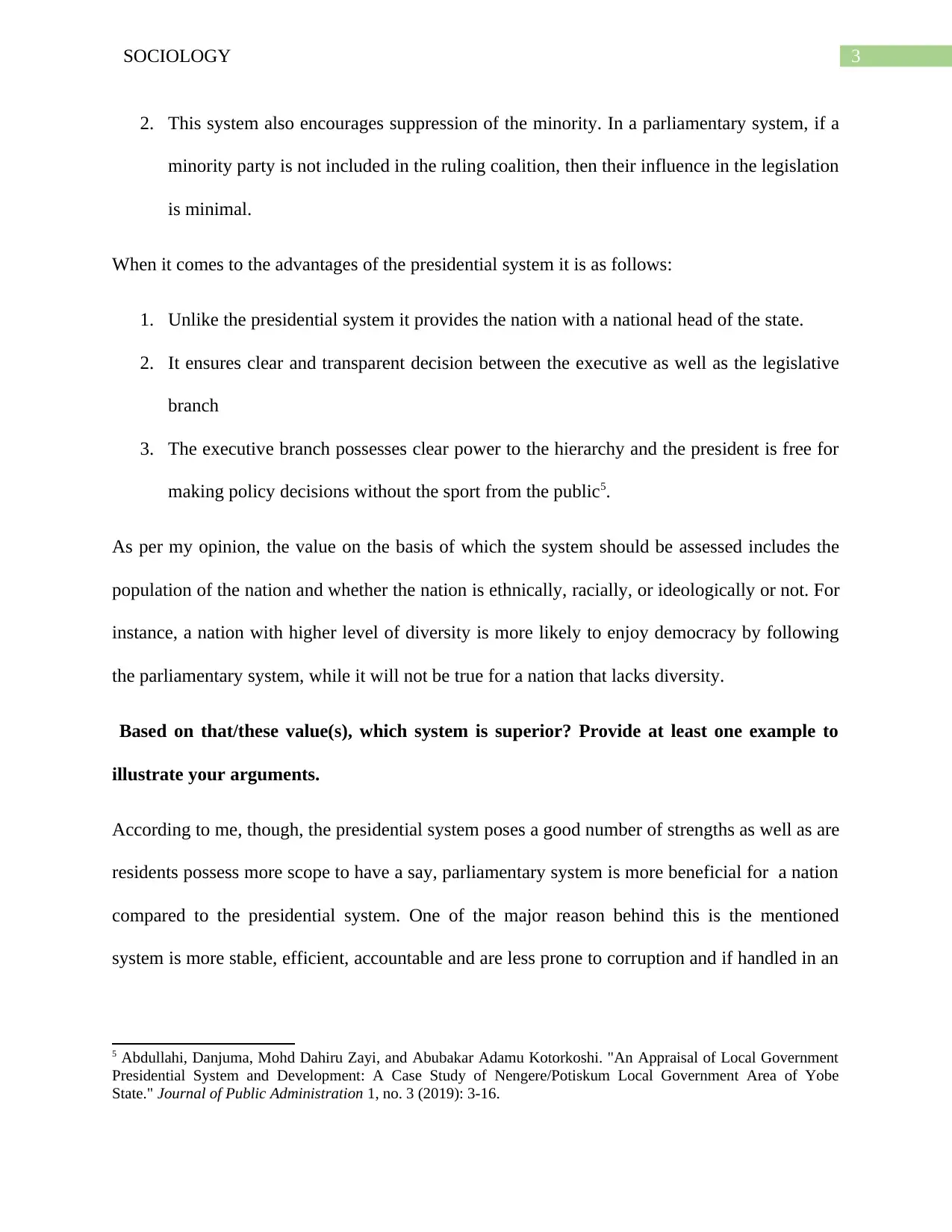
3SOCIOLOGY
2. This system also encourages suppression of the minority. In a parliamentary system, if a
minority party is not included in the ruling coalition, then their influence in the legislation
is minimal.
When it comes to the advantages of the presidential system it is as follows:
1. Unlike the presidential system it provides the nation with a national head of the state.
2. It ensures clear and transparent decision between the executive as well as the legislative
branch
3. The executive branch possesses clear power to the hierarchy and the president is free for
making policy decisions without the sport from the public5.
As per my opinion, the value on the basis of which the system should be assessed includes the
population of the nation and whether the nation is ethnically, racially, or ideologically or not. For
instance, a nation with higher level of diversity is more likely to enjoy democracy by following
the parliamentary system, while it will not be true for a nation that lacks diversity.
Based on that/these value(s), which system is superior? Provide at least one example to
illustrate your arguments.
According to me, though, the presidential system poses a good number of strengths as well as are
residents possess more scope to have a say, parliamentary system is more beneficial for a nation
compared to the presidential system. One of the major reason behind this is the mentioned
system is more stable, efficient, accountable and are less prone to corruption and if handled in an
5 Abdullahi, Danjuma, Mohd Dahiru Zayi, and Abubakar Adamu Kotorkoshi. "An Appraisal of Local Government
Presidential System and Development: A Case Study of Nengere/Potiskum Local Government Area of Yobe
State." Journal of Public Administration 1, no. 3 (2019): 3-16.
2. This system also encourages suppression of the minority. In a parliamentary system, if a
minority party is not included in the ruling coalition, then their influence in the legislation
is minimal.
When it comes to the advantages of the presidential system it is as follows:
1. Unlike the presidential system it provides the nation with a national head of the state.
2. It ensures clear and transparent decision between the executive as well as the legislative
branch
3. The executive branch possesses clear power to the hierarchy and the president is free for
making policy decisions without the sport from the public5.
As per my opinion, the value on the basis of which the system should be assessed includes the
population of the nation and whether the nation is ethnically, racially, or ideologically or not. For
instance, a nation with higher level of diversity is more likely to enjoy democracy by following
the parliamentary system, while it will not be true for a nation that lacks diversity.
Based on that/these value(s), which system is superior? Provide at least one example to
illustrate your arguments.
According to me, though, the presidential system poses a good number of strengths as well as are
residents possess more scope to have a say, parliamentary system is more beneficial for a nation
compared to the presidential system. One of the major reason behind this is the mentioned
system is more stable, efficient, accountable and are less prone to corruption and if handled in an
5 Abdullahi, Danjuma, Mohd Dahiru Zayi, and Abubakar Adamu Kotorkoshi. "An Appraisal of Local Government
Presidential System and Development: A Case Study of Nengere/Potiskum Local Government Area of Yobe
State." Journal of Public Administration 1, no. 3 (2019): 3-16.
Secure Best Marks with AI Grader
Need help grading? Try our AI Grader for instant feedback on your assignments.
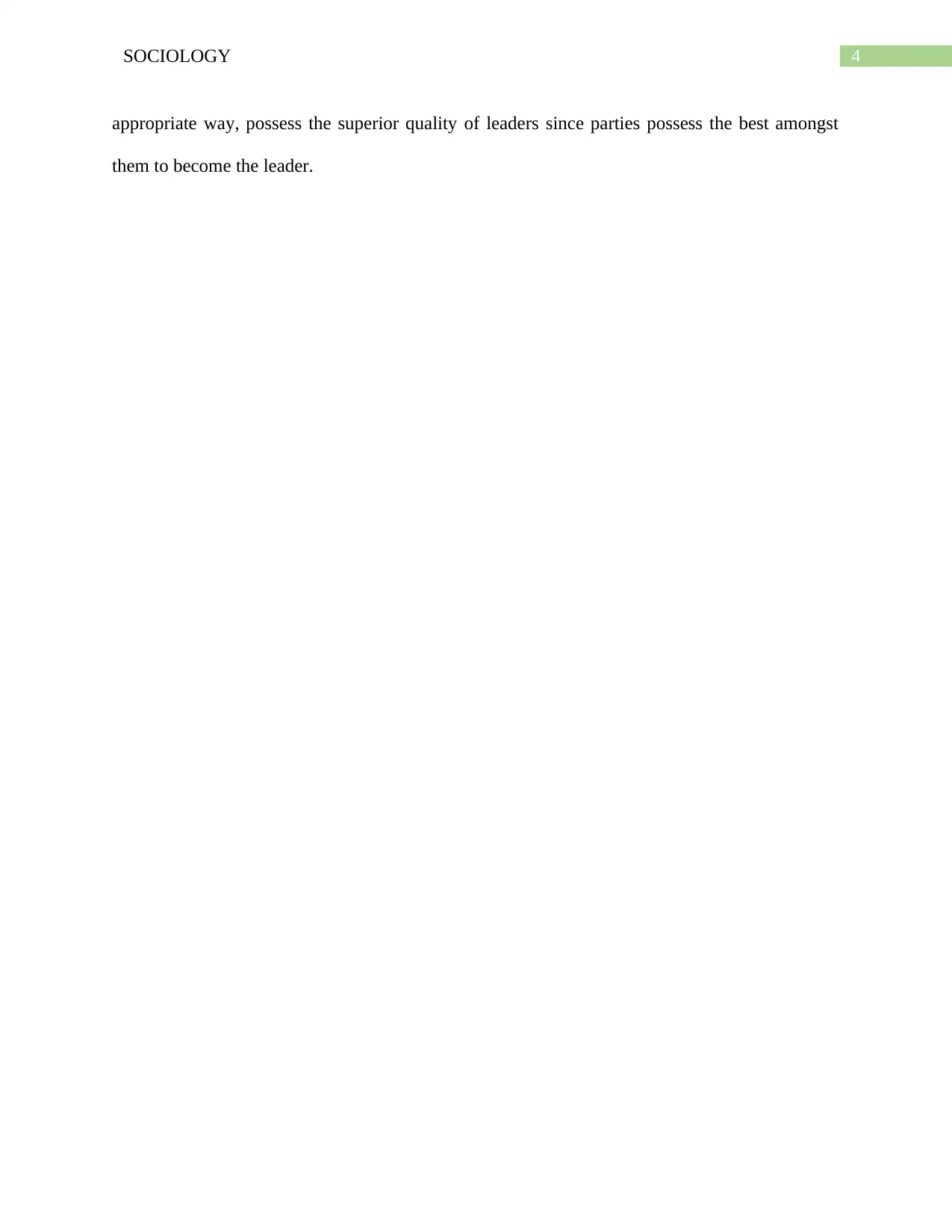
4SOCIOLOGY
appropriate way, possess the superior quality of leaders since parties possess the best amongst
them to become the leader.
appropriate way, possess the superior quality of leaders since parties possess the best amongst
them to become the leader.
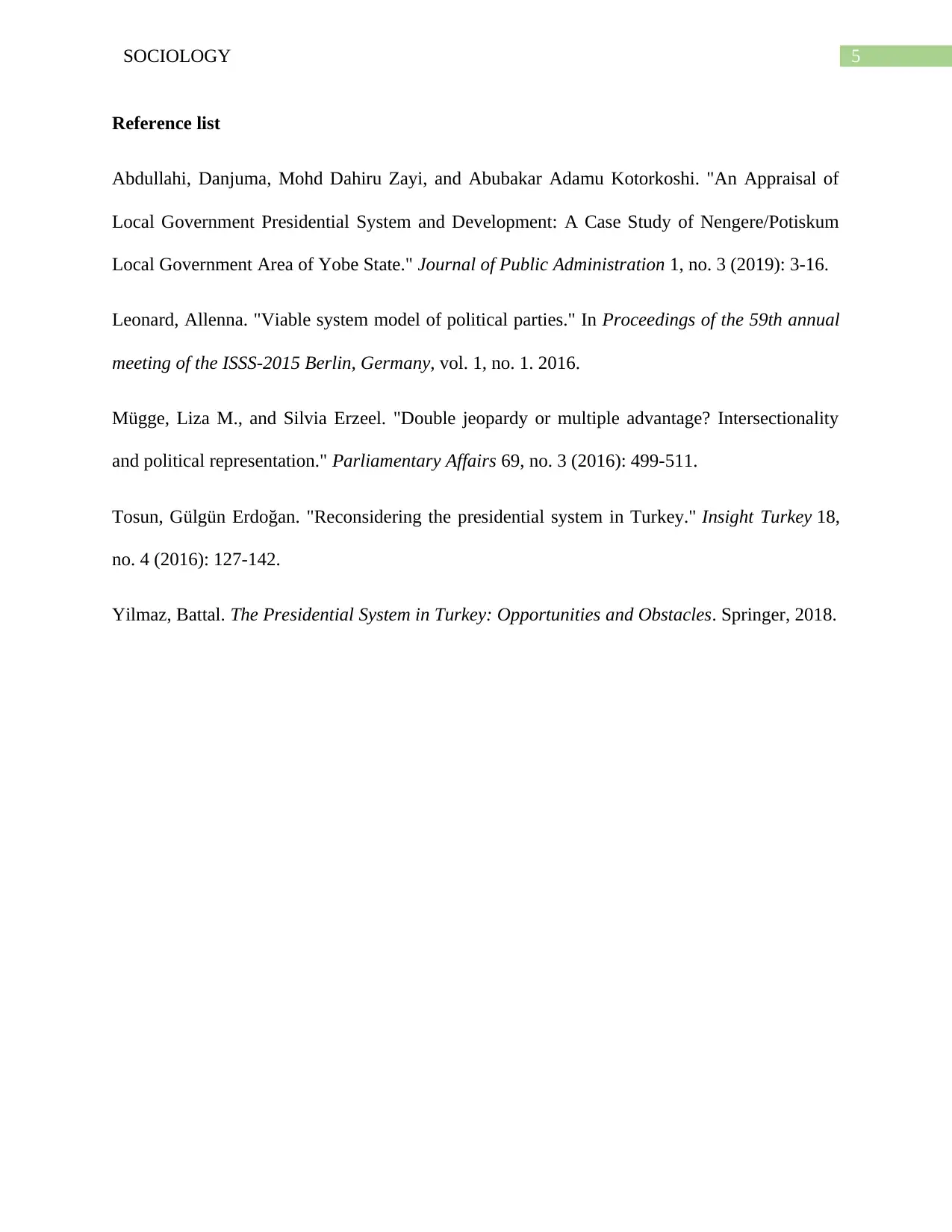
5SOCIOLOGY
Reference list
Abdullahi, Danjuma, Mohd Dahiru Zayi, and Abubakar Adamu Kotorkoshi. "An Appraisal of
Local Government Presidential System and Development: A Case Study of Nengere/Potiskum
Local Government Area of Yobe State." Journal of Public Administration 1, no. 3 (2019): 3-16.
Leonard, Allenna. "Viable system model of political parties." In Proceedings of the 59th annual
meeting of the ISSS-2015 Berlin, Germany, vol. 1, no. 1. 2016.
Mügge, Liza M., and Silvia Erzeel. "Double jeopardy or multiple advantage? Intersectionality
and political representation." Parliamentary Affairs 69, no. 3 (2016): 499-511.
Tosun, Gülgün Erdoğan. "Reconsidering the presidential system in Turkey." Insight Turkey 18,
no. 4 (2016): 127-142.
Yilmaz, Battal. The Presidential System in Turkey: Opportunities and Obstacles. Springer, 2018.
Reference list
Abdullahi, Danjuma, Mohd Dahiru Zayi, and Abubakar Adamu Kotorkoshi. "An Appraisal of
Local Government Presidential System and Development: A Case Study of Nengere/Potiskum
Local Government Area of Yobe State." Journal of Public Administration 1, no. 3 (2019): 3-16.
Leonard, Allenna. "Viable system model of political parties." In Proceedings of the 59th annual
meeting of the ISSS-2015 Berlin, Germany, vol. 1, no. 1. 2016.
Mügge, Liza M., and Silvia Erzeel. "Double jeopardy or multiple advantage? Intersectionality
and political representation." Parliamentary Affairs 69, no. 3 (2016): 499-511.
Tosun, Gülgün Erdoğan. "Reconsidering the presidential system in Turkey." Insight Turkey 18,
no. 4 (2016): 127-142.
Yilmaz, Battal. The Presidential System in Turkey: Opportunities and Obstacles. Springer, 2018.
1 out of 6
Related Documents
Your All-in-One AI-Powered Toolkit for Academic Success.
+13062052269
info@desklib.com
Available 24*7 on WhatsApp / Email
![[object Object]](/_next/static/media/star-bottom.7253800d.svg)
Unlock your academic potential
© 2024 | Zucol Services PVT LTD | All rights reserved.





